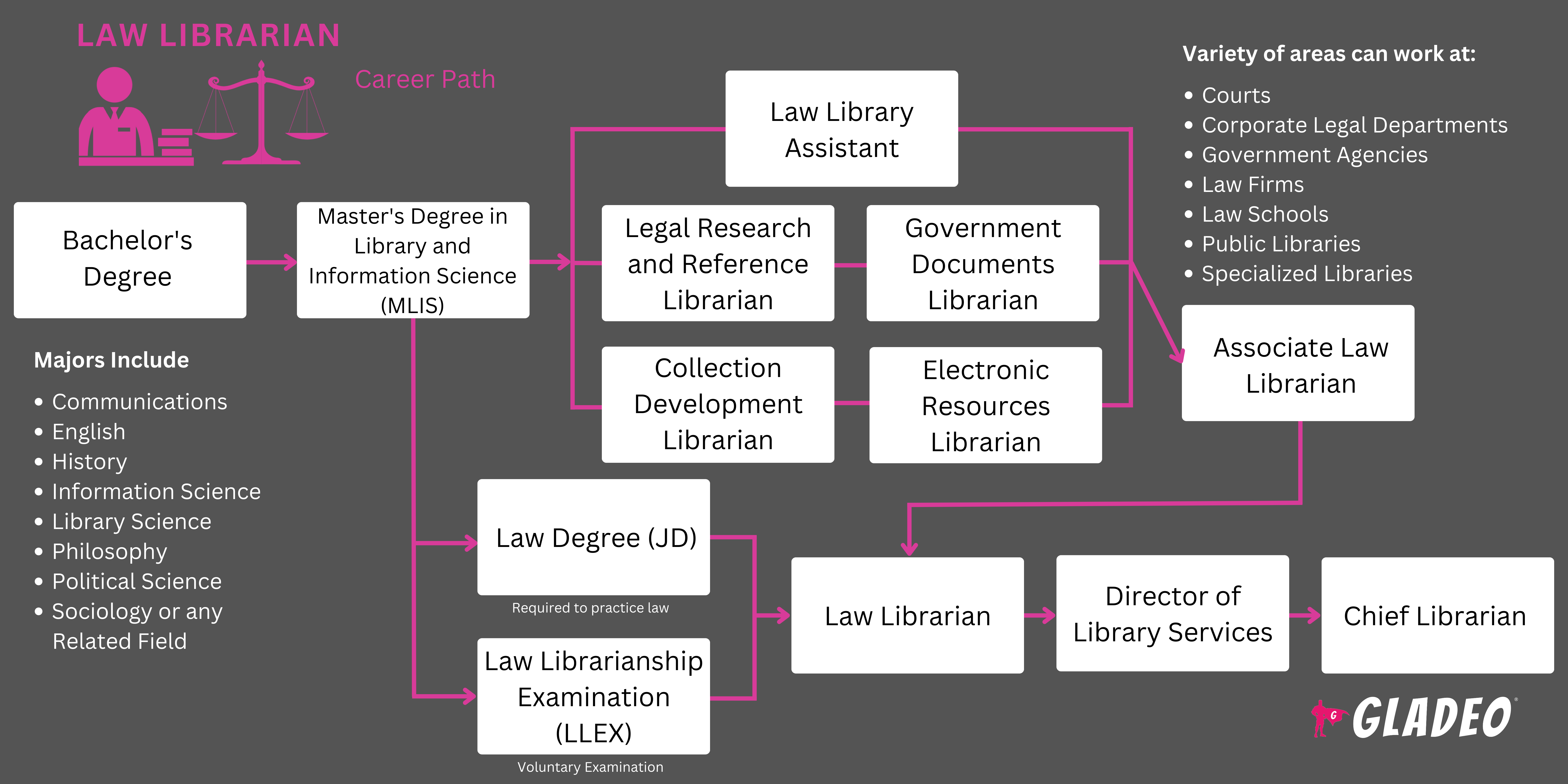Spotlights
Legal Information Specialist, Legal Research Librarian, Law Library Manager, Reference Librarian (with a focus on law), Legal Resources Coordinator, Legal Reference Specialist, Legal Collection Manager
Law Library Services Coordinator, Legal Knowledge Manager, Legal Information Services Librarian
Our legal system is extraordinarily complex. It’s so complicated we usually need attorneys to help us when we have legal matters to deal with. But even attorneys don’t know everything. They must frequently conduct research to find answers and inform their strategies.
There are decades of legal materials to consider, such as statutes, codes, casebooks, court opinions, rules, records, regulations, journals, handbooks, databases, dictionaries, and more!
The amount of available information is so vast that attorneys rely on Law Librarians to help them find what they’re looking for. In many cases, lawyers don’t even know what they’re looking for — but the librarians point them in the right direction.
As legal experts themselves, Law Librarians manage and curate legal resources in various formats, assist patrons in locating relevant information, and provide training on research methods. They may work in law schools, private law firms, corporate legal departments, government agencies, or law libraries that are open to the general public!
- Helping others navigate complex legal information and materials
- Ensuring access to accurate and comprehensive legal resources
- Working in a dynamic, intellectually stimulating environment
- Contributing to education and justice within the legal system
Lịch làm việc
- Law Librarians typically work full-time office hours. Some private company jobs may require longer hours and some positions require evening or weekend work, particularly in academic settings.
Nhiệm vụ tiêu biểu
- Duy trì cơ sở dữ liệu thư viện có tổ chức và hệ thống tham chiếu
- Help patrons find materials and resources
- Check materials out to patrons. Upon their return, check materials back into the system, assess for damage, and put items back
- Review legal catalogs and order legal resources inventory from vendors
- Plan and manage budgets. Order computers and other IT resources
- Curate a variety of legal materials relevant to employer and patron needs, including print and digital legal resources
- Tận dụng các cơ hội cho vay liên thư viện
- Add incoming legal materials to the library database
- Apply call number labels to legal books and resources
Trách nhiệm bổ sung
- Create and enforce library policies
- Train and supervise assistants, staff, and volunteers
- Đảm bảo khả năng tiếp cận và tuân thủ các tiêu chuẩn của Đạo luật Người khuyết tật Hoa Kỳ
- Stay current with developments in legal information, research techniques, and technology
Kỹ năng mềm
- Phân tích
- Chú ý đến chi tiết
- Hợp tác
- Kỹ năng giao tiếp
- Phối hợp
- Dịch vụ khách hàng
- Quyết định
- Kỹ năng giao tiếp
- Kỹ năng tổ chức
- Nhận thức
- Giải quyết vấn đề
- Phán xét hợp lý
- Quản lý thời gian
Kỹ năng kỹ thuật
Law Librarians should have technical skills related to:
- Basic IT troubleshooting
- Legal citation and referencing styles
- Ngân sách
- Maintaining digital libraries
- Cataloging systems and metadata standards
- Library software
- Legal research databases (e.g., Westlaw, LexisNexis)
- Corporate legal departments
- Cơ quan chính phủ
- Công ty luật
- Law schools
- Public law libraries
Law Librarians are vital members of the legal profession! They play a crucial role in assisting lawyers by providing valuable support in various aspects of legal research. Because their help is so important, they must stay current with legal developments and emerging technologies, which requires continuous learning. They sometimes work under tight deadlines while juggling multiple tasks at once. Due to the nature of their work, they have to maintain strict confidentiality and ethical standards.
Law Librarians increasingly use technology to enhance legal research and library services in general. This includes the use of artificial intelligence for predictive analytics since AI can analyze past case outcomes to predict future case results.
In addition, AI-driven tools help lawyers understand complex legal texts, making research more efficient. AI can also automate the review of legal documents, contracts, and discovery materials, reducing the time spent on these tasks.
Another growing trend is the development of digital libraries which can store vast amounts of resources, accessible 24/7!
Law Librarians likely enjoyed reading and doing research. They may have been highly organized growing up, with a keen interest in helping others. Many participated in debate clubs, library clubs, or similar activities.
- Không yêu cầu chuyên ngành đại học cụ thể, nhưng cử nhân nghệ thuật tự do là phổ biến
- Law Librarians don’t have to be lawyers themselves, but they usually need a master’s degree in library science (MLS) from a program accredited by the American Library Association
- A master’s in information science (MIS) may also work
- Some Law Librarians earn a Juris Doctor degree as well, though it’s only required for ~20% of relevant jobs
- Many schools offer a joint JD/MLS degree
- Relevant college course topics include:
- Quản lý cơ sở dữ liệu
- Information organization and management
- Intellectual property law
- Legal research methods
- Legal writing and citation
- Students should complete internships in legal libraries to gain practical experience
- Law Librarians can join the American Association of Law Libraries or other organizations to take advantage of continuing education resources, scholarships, and networking opportunities
- Law Librarians often finish undergraduate degrees in legal studies, history, literature, or education. These degrees are very suitable for online and hybrid study. Graduates sign up for a Master of Library Science (or related program like Master of Information Studies or Master of Library and Information Studies). Programs should be accredited by the American Library Association.
Check out the faculty biographies to learn about their expertise in the field. - Review the job placement rates for graduates.
- So sánh chi phí học phí và lệ phí, lưu ý chi phí trong tiểu bang và ngoài tiểu bang.
- Xem xét các lựa chọn học bổng và hỗ trợ tài chính, bao gồm cả trợ cấp liên bang Pell Grants .
- High school classes in English, history, business, and computer science are useful
- Engage in activities that involve research, such as debate clubs or library clubs
- Gain practical experience through part-time jobs, volunteer work, or internships in libraries
- Keep up with industry trends related to new technologies such as AI
- Watch YouTube videos about library science and legal research
- Read articles and journals such as Library Journal or Legal Reference Services Quarterly
- Visit public law libraries near you. Ask if you can set up an informational interview with one of the Law Librarians there, or contact a local law firm
- Look for Library Science program scholarships to help take off the financial burden of school

- Apply for library-related internships to gain practical experience and make connections
- Consider starting out as a paralegal or library assistant while working on your degrees at night
- Sign up for alerts on popular job portals like ZipRecruiter, SimplyHired, Indeed, Monster, and Glassdoor
- Hỏi mọi người trong mạng của bạn về các mẹo về cơ hội việc làm trong thư viện
- Move to where the jobs are! Per BLS, the states with the highest employment level for librarians are New York, Texas, California, Ohio, and Florida
- Liên hệ với các cựu giáo sư và người giám sát để xem liệu họ có đóng vai trò là tài liệu tham khảo cá nhân hay không
- Sử dụng trung tâm hướng nghiệp của trường bạn để được trợ giúp về sơ yếu lý lịch và phỏng vấn giả
- Check out Librarian resume samples
- Đảm bảo sơ yếu lý lịch của bạn không có lỗi, ngắn gọn và cập nhật
- Check out sample interview questions such as “Can you describe your experience with legal research databases such as Westlaw and LexisNexis?” or “How do you handle requests for information that may be confidential or sensitive?”
- Learn how to make an amazing first impression!
- Review Indeed’s How to Dress for an Interview
- Thảo luận với người giám sát của bạn về các cơ hội thăng chức hoặc tăng lương
- Consider earning a Juris Doctorate if it’ll help qualify you for advancement
- Train and mentor new Law Librarians and assistants
- Provide outstanding service to patrons to ensure positive experiences
- Stress accuracy and confidentiality at all times
- Be an active participant in professional organizations such as the American Association of Law Libraries
- Set goals for continual process improvement, such as incorporating new technologies
- Manage your budget effectively
- Luôn giữ bình tĩnh trước áp lực, ngay cả khi bạn phải đối mặt với một khách hàng quen khó chịu
- If needed to advance, apply for jobs with other organizations
Trang web
- AALL Spectrum
- Hiệp hội Thư viện Luật Hoa Kỳ
- Hiệp hội Thư viện Hoa Kỳ
- Hiệp hội Khoa học và Công nghệ Thông tin
- Hiệp hội các bộ sưu tập thư viện và dịch vụ kỹ thuật
- Hiệp hội các thư viện đại học và nghiên cứu
- Hiệp hội các Trung tâm Truyền thông Cao đẳng và Đại học
- Cornell Legal Information Institute
- Digital Library Federation
- International Association of Law Libraries
- Justia
- Law.com
- Law Librarians’ Society of Washington, D.C.
- Law Library Journal
- Law Library Microform Consortium
- Legal Information Management
- Legal Information Preservation Alliance
- LLRX.com
- Hiệp hội Thư viện Y khoa
- Hiệp hội thư viện đặc biệt
Sách vở
- Copyright Law for Librarians and Educators: Creative Strategies and Practical Solutions, by Kenneth D. Crews
- Law Librarian: Passbooks Study Guide, by National Learning Corporation
- Law Librarian Use of Google and its Apps & Features, by Primary Research Group Staff
Law Librarians are crucial to the legal profession, but their career field is relatively small compared to others. For those who want to explore other career options, consider jobs such as:
- Academic Librarian
- Nhà lưu trữ
- Attorney
- Giáo viên trung học phổ thông
- Information Scientist
- Điều phối viên giảng dạy
- Trợ giúp pháp lý
- Library Assistant
- Museum Worker
- Research Analyst
Nguồn cấp tin tức

Việc làm nổi bật

Các khóa học và công cụ trực tuyến








